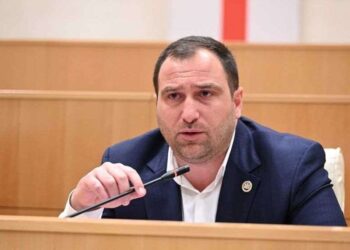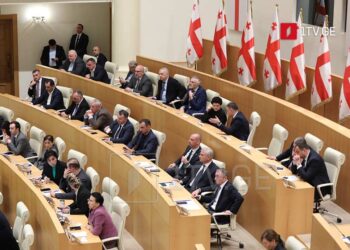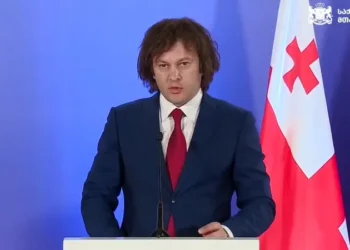Today, I am not standing at the tribune of the Parliament for the last time, but I am standing at this tribune for the first time as the President of a candidate country for the European Union. Congratulations to everyone on this great victory! We did it! – President of Georgia Salome Zurabishvili said while presenting the annual report at the plenary session of the Parliament.
The President noted that the year 2023 which ended with such a significant achievement and a newfound hope was not devoid of its challenges and difficulties.
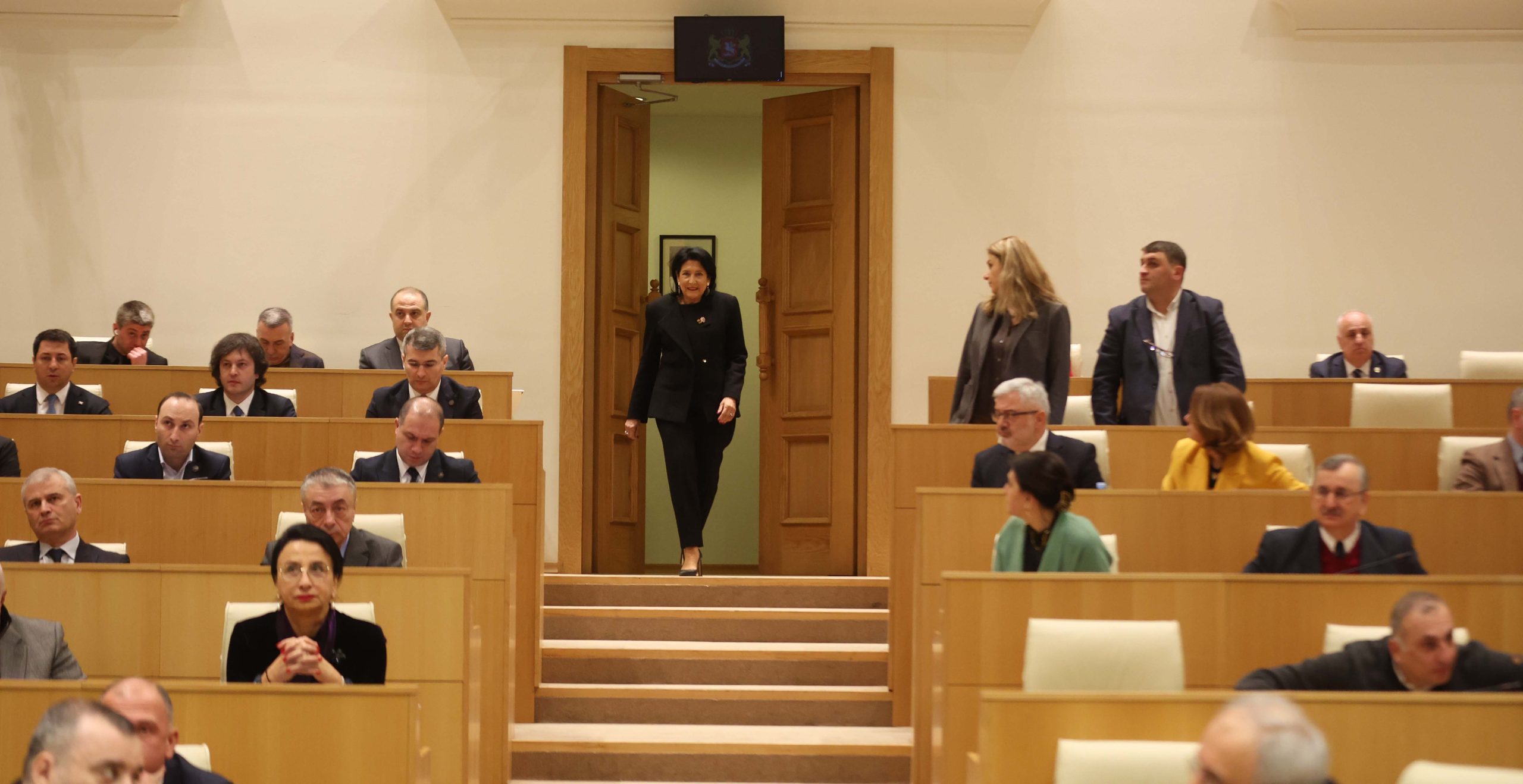
“Challenges persisted in the field of security – the relentless war instigated by Russia in Ukraine persisted. Russia failed to break Ukraine and could not undermine the unity and solidarity of Europe; rather, it strengthened it. Despite this failure (or perhaps because of it), Russia initiated a hybrid war (a war without traditional warfare) across the entire territory of Georgia. These attacks comprise every form and weapon. Russia’s intent to convert the port of Ochamchire into a military base seeks to shift the confrontation to the Black Sea, within our territorial waters, jeopardizing the strategic prospect of the Black Sea region. These attacks include declaring mobilization in occupied territories, taking steps toward annexation (such as those directed at the Ochamchire port, Bichvinta state residence, and Sokhumi Babushera airport), neglecting human rights, and erasing cultural and identity markers. The relentless intimidation, abduction, and targeting of civilians persist along the occupation line.
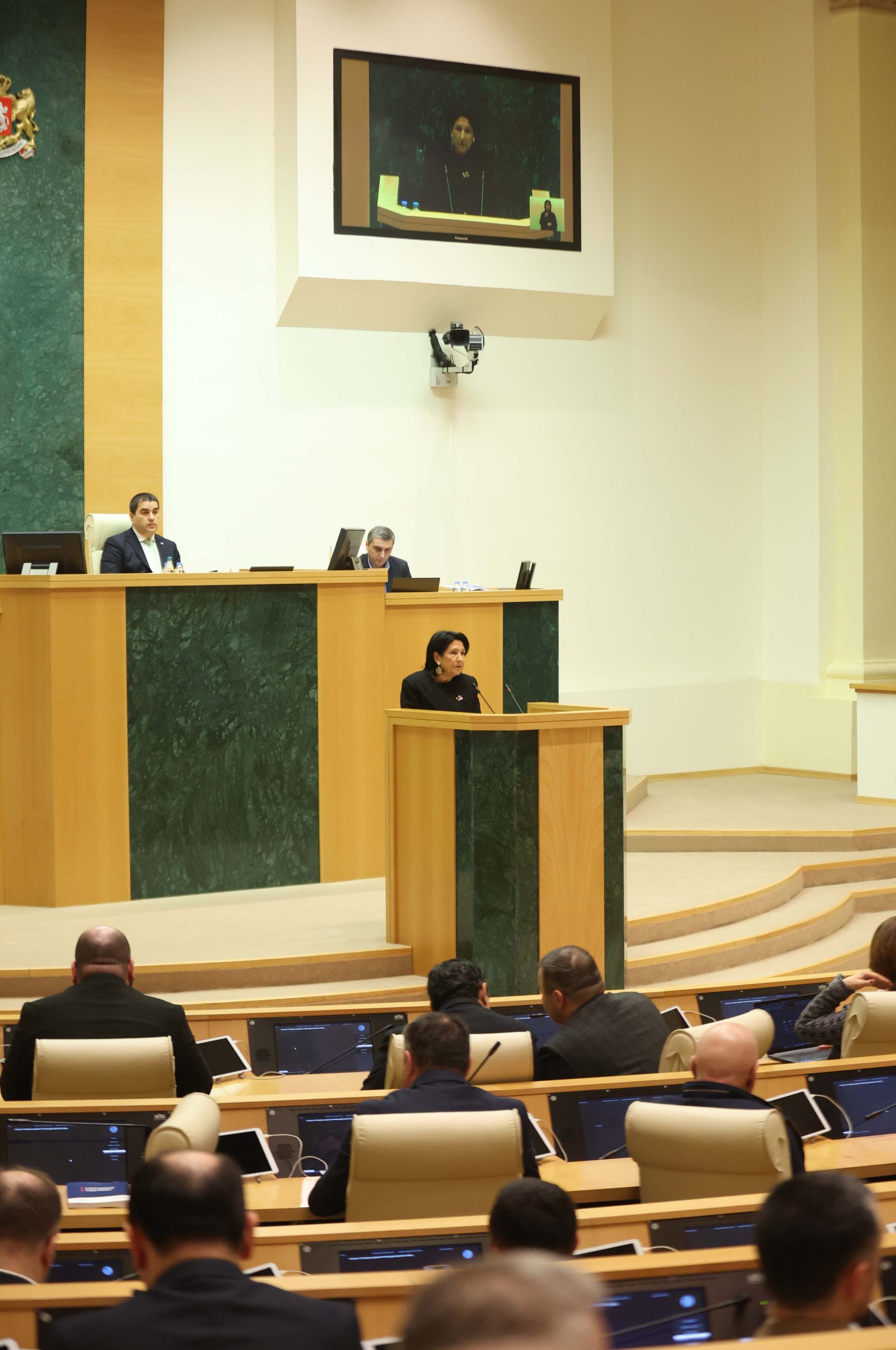
Nationwide anti-Western propaganda, along with pseudo-co-religionist narratives is being disseminated, the encouragement and financing of pro-Russian factions, escalating cyber-attacks on state institutions – indicative of what to expect in the wake of the upcoming election.
The hybrid warfare encompasses the massive influx of Russian immigrants, directly impacting the economy (sometimes positively, sometimes negatively) and heightening the nation’s reliance on Russian investments and markets – a reliance on Russian capital.
The hybrid strategy is the basis of various provocations, such as the resumption of flights, unhindered entry of FSB agents and other high-ranking officials, unhindered movements of Russian cruise ships in Batumi, and the display of Stalin’s icon in the Trinity Cathedral… These actions aim to instigate discord, and confrontation in society, and threaten us with destabilization.
There was no lack of challenges in terms of democracy.
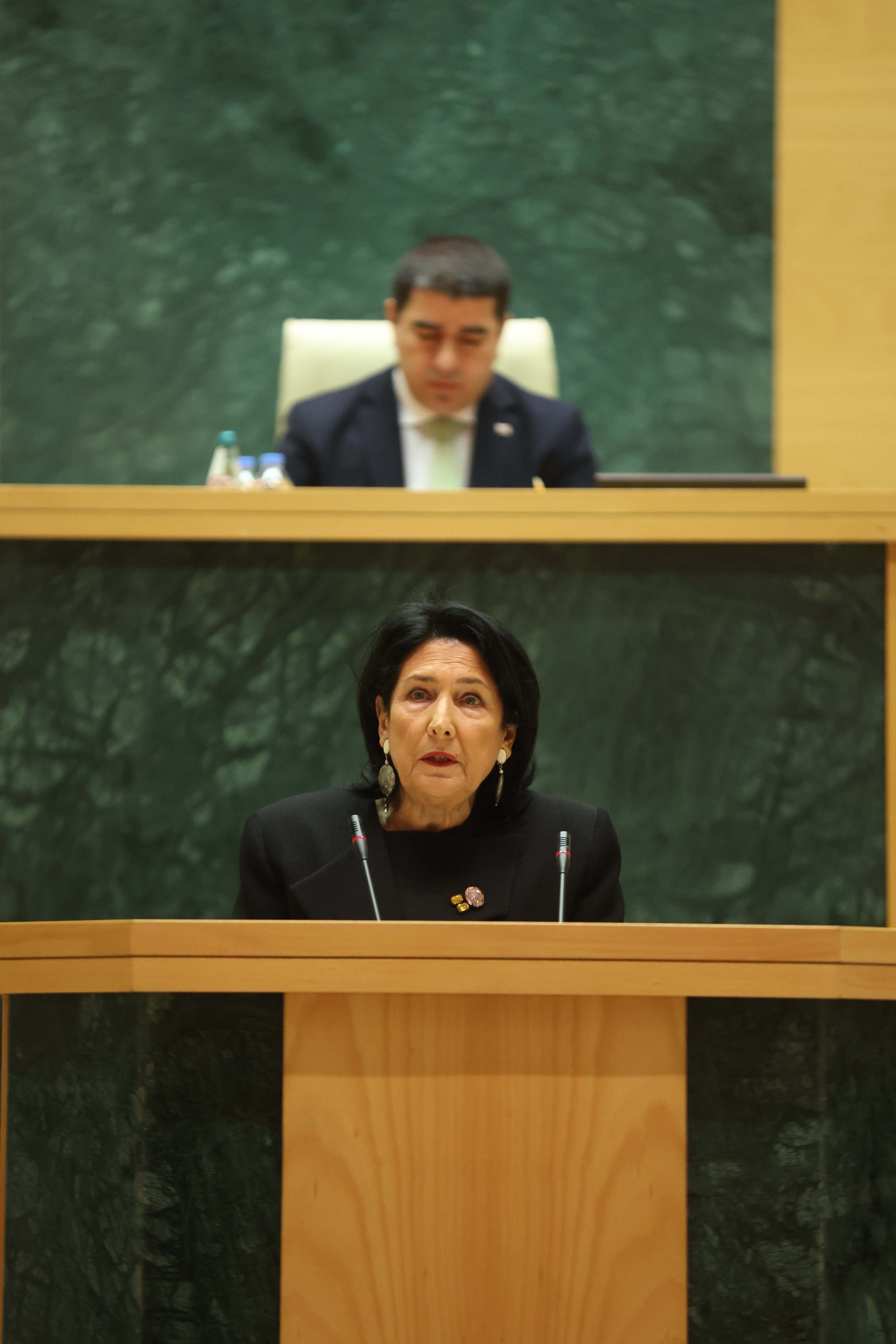
In 2023, instead of implementing democratic reforms, we witnessed an unprecedented strengthening of power, directly reflected in the initiation of ‘Russian law’. This legislation aimed to suppress civil society and an attempt at its disarmament.
Following the defeat of this legislation, it was followed by the law on the National Bank, alteration of the procedure for selecting the chairman of the CEC [the supreme body of Election Administration of Georgia], and ultimately in an attempt to impeach the president. This latter not only underscored the non-acceptance of the independence of the presidential institution but also highlighted the dire state of the Constitutional Court.
All of this occurs at a time when the primary objective of a country striving towards Europe should be to strengthen independent institutions.
The necessary balance among the branches of the state, which is the cornerstone of democracy, has been severely disrupted. There is no longer a dividing line between the party and the government. Instead of supervising and controlling the government, the parliament has become merely an implementer of party policies. After a short-lived attempt at a coalition government in 2012-2013, which followed the one-party systems of Eduard Shevardnadze and Mikheil Saakashvili, the country has reverted to the old, one-party monolithic model. Recent changes also follow this suit, emphasizing the maintenance and reinforcement of the one-party power system, supposedly labeled as the internal democracy of the party and/or the principle of rotation.
Elite corruption has taken on a new dimension, signaling that the appetite of the elite knows no bounds. In reality, nothing is under effective oversight, and no accountability is demonstrated. All because elite corruption serves as the essential cement that consolidates monolithic power around its reliable caste. They do not vie for power; instead of power, they engage in a distribution of wealth among themselves.
The deification and idolization of power are directly part of the Soviet legacy, with its vertical structure, one-party rule, authoritarian decision-making, extending gratitude, self-abasement and self-incrimination for survival, compromising materials, wire-tapping and snitching, clans and slaves, etc. (I am talking about the Soviet system here).
After independence, no government has possessed the strength or determination necessary to fully dismantle the monolithic power structure and restore a democratic balance of power.
Instead, power has merely changed hands, with new individuals assuming control, but the fundamental system itself has not and could not be changed.
This system entails the concentration of power in a single hand and along one vertical, utilizing the judiciary and all law enforcement agencies as branches of power support. The judicial clan has become the embodiment of this never-ending system: individuals like Murusidze and Chinchaladze serve the current ruling team with the same unwavering dedication as they did the previous one. If nothing changes, tomorrow they will simply align themselves with a new owner, pledging their loyalty to them.
This system is characterized by its desire to destroy the opposition. It neither needs political adversaries nor critical opinions. Therefore, it becomes imperative to demonize any alternative, using labels such as “traitors,” “agents,” or “radicals.” The narrative persists that “anyone contending my authority is therefore fighting against the country.” Compromising materials are tools of discredit and destruction, while bribery serves as a softer alternative.
The European orientation has also encountered a particular challenge.
Initially unnoticeably, and later more pronouncedly, our centuries-old orientation shifted its emphasis: anti-European and anti-Western sentiments transitioned from marginal political circles to state rhetoric. In turn, positions toward Russia notably softened. Further escalation in relations with Ukraine, and public distancing from the EU and the US regarding international sanctions at particularly critical junctures, cast doubt on the firmness of our foreign orientation. Through ambiguous rhetoric and steps, we have jeopardized the monumental efforts and achievements we have made toward European integration.
Despite these challenges, Georgia succeeded and obtained candidate status.
The society did not back down and fought to safeguard its future. The probity of the people, both at home and abroad, has demonstrated to everyone that our aspiration toward European integration has a ground and that the Georgian people are truly committed and united in pursuit of this objective. All of this has convinced our society that it possesses the strength to attain its goal. Additionally, the special role of free, European youth has emerged in building the nation’s future, establishing it as a beacon of hope.
Via our society’s experience, with its traditional tolerance, wisdom, and restraint, we avoided and overcame provocations of Russian immigration and propaganda. The society remains vigilant to Russia’s hybrid actions, and we retained stability and unshaken pro-Europeanness.
From a democratic standpoint, the courageous opposing opinion of the three judges of the Constitutional Court regarding the issue of impeachment, and the failure of the impeachment scenario from both legal and political perspectives, are viewed as positive indicators. The separation of three members and their resignation from the unilateral decision of the National Bank also signal positivity. The signs of society possessing a robust awareness and desire for democracy, a readiness to safeguard the progress achieved, and a refusal to tolerate setbacks, provide a foundation of hope. This embodies the power of people!
The granting of candidate status represents a new opportunity for the country’s future.
First and foremost, the opportunity to enhance security: For us, the most tragic and dangerous situation would be isolation, staying alone and, face-to-face with Russia. Candidacy and commencing negotiations tomorrow signify our entry into the European security space, thereby reclaiming our role as an active player on the international and regional stages. Consequently, we become firsthand partners with Europe, which has recently demonstrated its strength and adherence to its principles. Europe is a reliable and robust partner of a safe and peaceful region of tomorrow. A true testament to Europe’s sense of responsibility and democracy is its recent demonstration of dialogue and democratic principles, where every effort was made to achieve consensus without succumbing to the dictates of the majority. It has sent the strongest message to Moscow.
Europe also signifies bolstering independence: The European family has no alternative, where our identity, culture, and values will be safeguarded and highlighted. The route of Russification is not an alternative – we have already traversed it. This memory remains vivid within us. Our smaller, brotherly Caucasian nations, have traversed this path more tragically, some of which are now considered extinct. The Abkhazian language, culture, and identity are perilously positioned along this path! Europe, meanwhile, embodies a space of sovereign nations, diverse languages, minorities, regions, diverse cultures, and protection of identity through equality and legal protection.
Europe also means prosperity. Nowadays, Europe stands as the wealthiest region globally. However, wealth alone holds little significance unless it translates into universal prosperity, founded on the protection and fulfillment of life, health, and safety rights. This is what Europe promises us. This prosperity must be accessible to all and should not be monopolized by a privileged minority. The foundation of the European state cannot rest on anything other than these democratic principles, which ensure that citizens possess a range of safeguarded rights.
Citizens have the right to have their work safety ensured and to mitigate tragic incidents.
Citizens have the right to access healthcare within their own country, ensuring that traveling abroad or seeking shelter in another country is not deemed a necessary solution.
Citizens have the right to reside in a secure environment where European legislation regulates and just courts safeguard aspects such as food safety, chaotic constructions, the ecological environment, noise pollution, and the issue of uncontrolled stray animals, among others.
Citizens have the right to be protected from all forms of violence, including sexual harassment and actions that infringe upon dignity.
Prosperity also involves prevention, ensuring that if a disaster similar to the Shovi natural catastrophe were to occur again, the tragedy would not be repeated, and the state would not prove to be weak, relying solely on the heroism of individuals.
This is why the decision made on December 15 marked such a significant occasion. In 2023, Georgia solidified its position within the European family for the future. On this day, Europe conveyed a clear message: “You are Europeans, and your integration into Europe depends solely on you, your will, and the actions you take.”
Now, it is our turn to act!
The objective for 2024 is unequivocal! Our destiny lies within our control! This entails assuming the utmost responsibility, as we are presented with an unparalleled opportunity not only to formally integrate into the European sphere but also to instill a sense of European identity within ourselves, metamorphosing the post-Soviet nation into a vibrant, prosperous, resilient, European, and democratic entity. Only through such a transformation can we incite the youth to stay in the nation, beckon back the diaspora, and ignite fresh vigor, thereby forging our destiny independent of external influences.
Today, it’s time to consign the past to history and pave the path for a new Georgia. This signifies our European path and, consequently, our national path!
The imperatives laid forth by Europe align closely with the requisites for fortifying the nation, echoing the long-standing clamors of society: justice, equality, and security.
To realize this vision, it is imperative to bid farewell once and for all to the most deleterious vestiges of the Soviet era.
This entails transforming the power model and transitioning to the European model: the European governance framework embodies principles of free competition, pluralism of viewpoints, and governance predicated upon compromise and equitable power distribution. In the European paradigm, coalition governance, if not unavoidable is commonplace, which means that at least the dialogue between the political factions is possible and establishing the common ground is necessary.
This signifies the battle against corruption to establish a novel European-style market and social economy: wherein wealth is equitably dispersed, budget allocations reflect the well-being of the majority, private initiatives are unhindered, and procurement processes are transparent and equitable. Attainment of success should hinge on merit, talent, and diligence rather than on connections and favoritism within circles of influence.
The European model mandates a just judiciary: liberation of the economy, safeguarding human rights, and fostering equitable conditions for political entities – all matters necessitate recourse to an impartial court; a court that upholds and applies the principles of the rule of law, shielding the vulnerable from the powerful, the marginalized from the privileged, and the just from oppressive forces.
It is evident that no single side can solely fulfill these priorities, as the duty over these endeavors collectively rests on the commitment of every individual to the nation and its future.
However, concurrently, it is apparent that the primary duty and accountability lie with those vested with the levers of power, namely the government, the parliamentary majority, and now too, to their leader, Bidzina Ivanishvili. They bear both a collective and individual responsibility to promptly actualize the nine recommendations laid out by the European Union.
As the president of this nation, I cannot and will not preemptively assess the new prime minister or evaluate the implications of one’s arrival, another’s departure, or incentivizing the third. Nevertheless, it is incumbent upon me to vocalize from this podium everything our public is concerned with, of which they have the right to receive a response. Such accountability to the people is the main principle of democracy.
I direct my query to the new prime minister, implicated in the admission of Gavrilov into the national parliament, the revocation of Charles Michel’s document, anti-European rhetoric, and impeachment proceedings: How do you intend to adhere to the public’s European mandate and specifically enact the European recommendations before the elections?!
Will you present a comprehensive plan delineating the recalibration of the Supreme Council of Justice and the Supreme Court within a stipulated timeframe; how you will ensure consensus on the formation of the Election Administration of Georgia, provide the anti-corruption bureau with investigatory powers and independence, ensure the independence of the National Bank of Georgia, and align with the foreign and defense policies of the European Union?
However, the principal addressee of the public’s inquiries today transcends the prime minister, the chairman of the Parliament, or the chairman of the ruling party —it is the individual effectively steering the nation.
Therefore, I address my inquiries to Bidzina Ivanishvili. The public is entitled to receive your clarification regarding the statements made upon your return: concerning corruption, the nation’s foreign policy, personnel changes within the government, and whether you terminated an individual’s position due to their guilt before the nation, a divergence of opinions, or other undisclosed reasons.
As society aims for a new European governance model, clarity is crucial regarding how and when the transition from a single-party, monolithic, and hierarchical structure to a democratic European framework will occur. The public eagerly awaits your response regarding when you will dismiss Murusidze-Chinchaladze from the judiciary. While you confront the United National Movement on one front, remnants of it persist unaddressed on the other.
I also extend my address to the opposition. You too carry the responsibility. Cease the fighting and animosity toward each other, as it fosters despondency and nihilism in society. It is not my prerogative to impose unity or dissolution upon you, but I appeal to you to strive to converge on the main priorities of the nation. Demonstrate to the public that despite your divergent ideologies, you can engage in dialogue, collaborate, and achieve outcomes in pursuit of our European aspirations. The primary mission of the opposition is to mobilize and garner public support for the European cause.
I implore the public; your role and engagement will be pivotal. At this critical juncture, it is perplexing why there should be any attempt or inclination toward propagating hopelessness, self-reproach, and pessimism. Such sentiments are unwarranted in our country today. None among us has the right to stagnate, succumb to inertia, or forfeit one of the brightest and most attainable prospects for our future. When we discuss the future, the will, and the vision of the people, the time has arrived for every voice and will to be truly registered, as the upcoming elections will shape our future. It is the responsibility and duty of every citizen to actively participate therein. Active participation necessitates complete mobilization. If the future is being shaped today, failing to engage therein constitutes a dereliction of duty.
I appeal to our diaspora citizens, who are equally responsible for contributing to shaping the nation’s future: familiarize yourselves with your rights, and complete consular registration promptly to ensure the timely request for the establishment of new polling stations, a right enshrined in law. Advocate for an extension of election days similar to other European nations. Participation in elections poses no threat, even for those residing abroad illegally—a fact confirmed both verbally and practically by our allies. Personally, I will be the protector of your election rights.
To the youth, I emphasize: your contributions to last year’s triumph were substantial, and now, your involvement is paramount in preparing for the forthcoming pivotal phase. This nation is yours, boasting a glorious past and an equally glorious future; don’t leave it to anyone else!
History across various nations attests that unprecedented youth activism during elections can alter outcomes and shape the future. You can do this too!
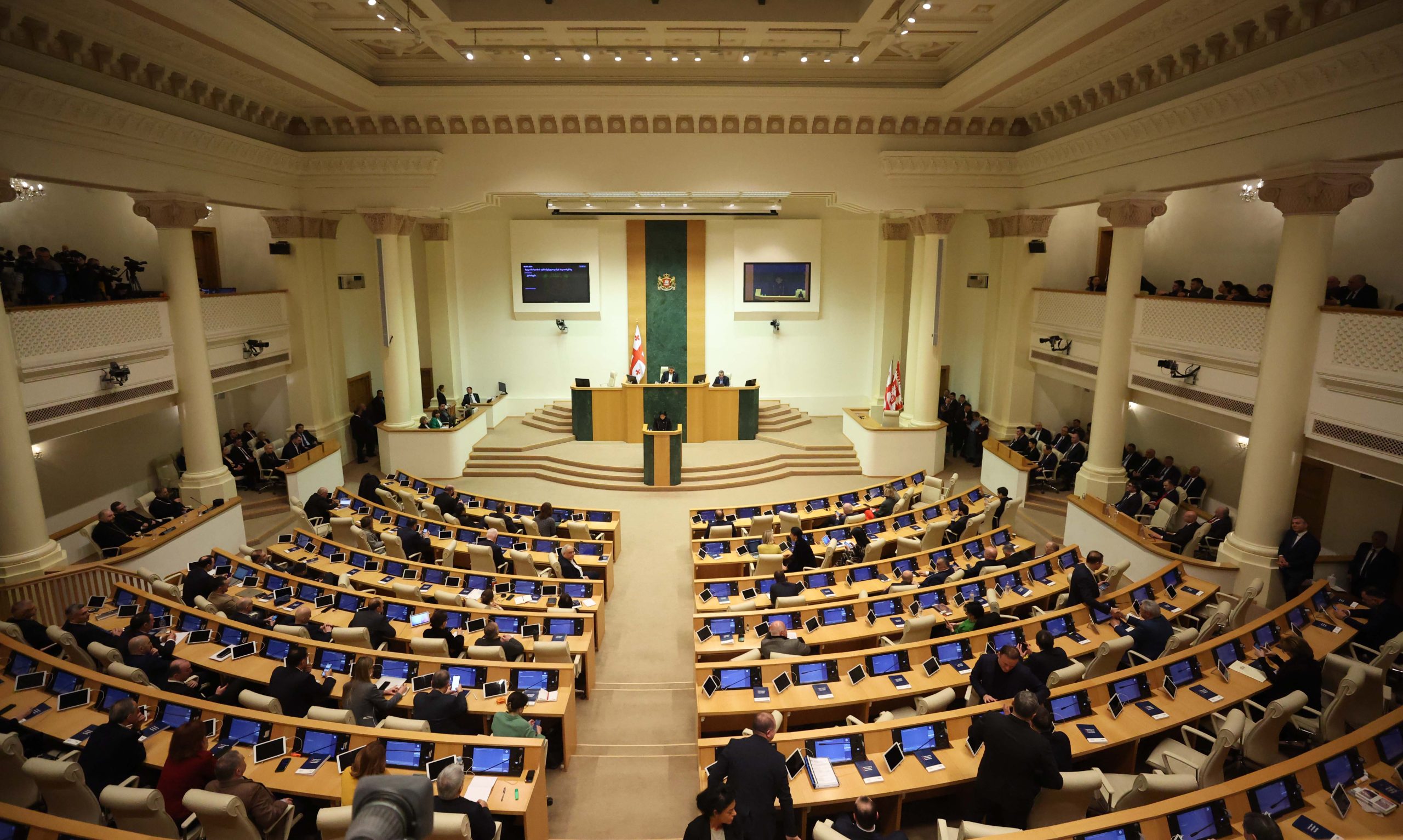 Lastly, it is imperative for everyone to understand that these elections transcend mere voting for one party over another, a particular political program, or leader, or abstaining from voting due to personal preferences. Today, we stand at a decisive juncture in our history where, through elections, we will determine our future, vote for a new governance model, and a new economy – ultimately, a new European state.
Lastly, it is imperative for everyone to understand that these elections transcend mere voting for one party over another, a particular political program, or leader, or abstaining from voting due to personal preferences. Today, we stand at a decisive juncture in our history where, through elections, we will determine our future, vote for a new governance model, and a new economy – ultimately, a new European state.
Do not perceive that I do not sense a significant responsibility in the face of this historical task, not as one with specific legal or material leverage (which I do not possess), but as the moral force and transmitter of the state position. Hence, throughout this challenging period, I shall remain steadfast by your side, acting as an observer, welder, and supervisor of these processes.
Certain individuals may have harbored or continue to harbor the expectation that resentment, harassment, or other adversities might wear me down, weaken my resolve, and compel me to forsake the oath I swore before you, the power of which I feel to this day. I assure you that I will remain steadfast, loyal to this oath and the Constitution until the very end.
Someone might also be eager to thrust me into the arena of political wrestling, depicting me as the leader of a political force, whether of the ruling party or the opposition. In vain! I have traversed this path. I believe that today, the country requires a non-partisan, yet principled, state leader possessing a strategic vision, and devoid of political ambitions and personal interests, who will serve the ultimate goal to the very end: to replace the Soviet past with a European future, to perpetually fortify the country’s independence within a free and peaceful European family.
I am overjoyed that this significant step toward Europe has been taken during this very mandate, which has always been and continues to be the primary objective of my involvement in Georgian politics. I am not planning to or need to engage in any competition regarding the extent of my contribution to this victory, as it stands as an achievement for all of Georgia. Now is not the time for us to drift apart, but rather the time to bring this achievement to fruition. On a personal level, I am committed to relentlessly pursuing this objective, whether within the nation or extending beyond its borders.
I caution you all to recognize and understand that our country, alongside our profoundly fatigued and disappointed society, can no longer endure endless hatred, divisive and destructive elections (characterized by a winner-takes-all mentality), the preaching of revenge, and the relentless pursuit of scapegoats. What our country requires now is appeasement and protection, and above all, the ability to envision the future of the country and have faith in one’s perspectives within it. Therefore, from this podium today, I present to you a path out of this deadlock, ensuring that we do not squander this exceptional opportunity.
The country yearns for unity. Society no longer believes in, nor desires to witness, the schemes of party unification that have already been attempted more than once. It remains unconvinced by singular claims of absolute victory. What it needs is a tangible objective, a rallying point that brings together vital forces and mobilizes energy toward a singular goal.
We have a goal – the European future. To achieve this, consolidation of key priorities is imperative. This can be accomplished through the formation of a united platform. This is what I am proposing – to create a charter of the future – a united platform for Europe!
I am prepared to assume my responsibility for the formation of this platform and to establish a coordination center within my administration. This center will consolidate all specific proposals regarding European priorities, and through dialogue and consensus, it will facilitate to crafting a united document.
For this purpose, in the coming days, I intend to meet with representatives from across the political spectrum as well as interested individuals from civil society. This approach aims to be inclusive, and I am fully receptive to meeting and listening to all.
There is no alternative winning formula, as the divisions and confrontations of the past will only breed skepticism and hopelessness, ultimately weakening the country.
The winning formula does not signify the triumph of any particular side or party, but rather the triumph of unity, Europeanness, and the country itself. Just as Georgia emerged victorious on December 15, it must now continue to prevail through implementing reforms and conducting fair elections. This stands as the sole guarantee for stability, peace, and progress.
As it has been throughout all stages of my political journey, my role remains unchanged: I stand at the forefront of independence, nationhood, democracy, and the European future. Just as I have done until today, I will continue to categorically oppose any attempts to revert to the Soviet-Russian past and sabotage the European opportunities.
Finally, I want it to be clear to everyone that this peaceful, fair, and equal future belongs not only to us but also to those in occupied Abkhazia and Tskhinvali who can no longer protect their basic human rights, cultural identity, language, and lands from forceful alienation. Instead, a reliable and trustworthy path lies ahead for us to enter Europe together. This future has no alternative; it is the will of the Georgian people, and it is our duty to fulfill this will,” Salome Zurabishvili stated.


